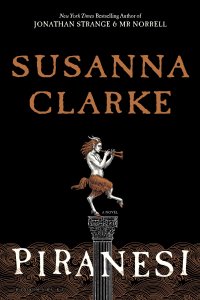2021 World Fantasy Convention Report

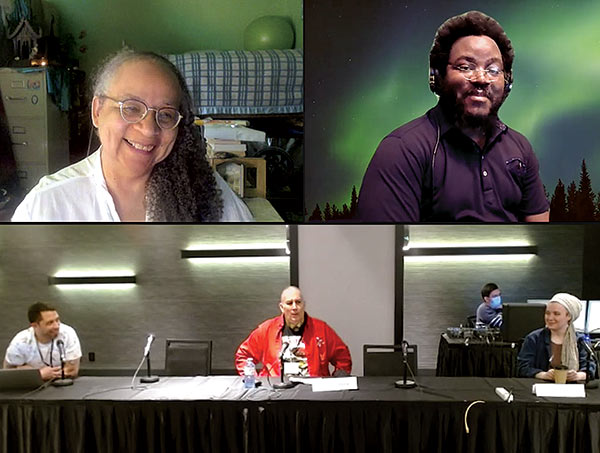
The 47th World Fantasy Convention was held as a hybrid event November 4-7, 2021, with the Hôtel Bonaventure in Montréal, Canada hosting the in-person portion. Guests of honor were Nisi Shawl, John Picacio, and André-François Ruaud, with special guests Owl Goingback, Yves Meynard, Brandon O’Brien, and Julie E. Czerneda; Christine Taylor-Butler was toastmaster. Life Achievement Awards winners were Megan Lindholm and Howard Waldrop.
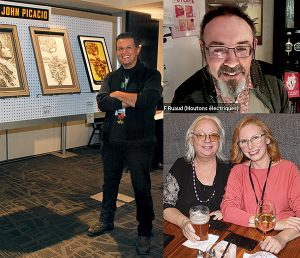
In-person attendance was fraught with the challenges and extra requirements of travel, resulting in many individuals not showing up or arriving late due to travel complications. Guests Shawl and O’Brien attended virtually. There were 470 total memberships representing six provinces, 29 states, and three countries (Canada, US, UK), including staff, dealers, and so on. 334 of these were attending memberships, with 207 warm bodies at the con proper. Virtual memberships counted 40, and there were 14 supporting. 260 individuals were no-shows, including virtual members.
2020’s online World Fantasy attendance saw 547 registered members representing 19 countries, plus 11 supporting members. Both conventions were down compared to 2019, which saw 660 warm bodies out of 762 total memberships purchased.
Con-goers did not receive the customary book bag: this year’s was delayed due to COVID related global shipping problems; the books themselves were there at the convention, and World Fantasy plans to mail the bags to attendees. Members received the full-sized, perfect-bound souvenir book featuring cover art by GoH Picacio, as well as more Picacio art inside, plus the committee list, the World Fantasy Award nominations and honorees, appreciations and bibliographies for the toastmaster, GOHs, and special guests (except for Brandon O’Brien) and Life Achievement Awards winners, an in memoriam, and short stories by Goingback, Czerneda, and Taylor-Butler.
CONVENTION NOTES

Programming was impacted by the absence of both virtual and in-person attendees, creating more challenges for programming chair Deanna Sjolander, and resulting in a number of last-minute changes, or situations where (in at least one case) only a single panelist showed up. Virtual items and hybrid panels were broadcast on Zoom, with hybrid including panelists who were physically at the convention site and panelists who were participating remotely. Sjolander said, “Interestingly, the hybrid panels and virtual screening room were lightly attended at the start of the weekend but became more attended as the weekend rolled on.” According to the World Fantasy 2021 Twitter, recorded sessions were available for members to access until November 30, 2021.
Programming started Thursday afternoon with readings and hybrid panel “First-Person Dead” featuring Brandon Ketchum, Brandon McNulty, Donna J. W. Munro, and Jason A. Wyckoff, followed by in-person panel “Fantasy as the (Thin) Mask of Reality” with Eileen Gunn, Ellen Klages, Yves Meynard, and Sienna Tristen. Opening Ceremonies were held at 8:00 p.m.
There were 53 program sessions scheduled (17 in-person, 20 hybrid, 16 virtual), plus 72 readings. Roughly ten in-person panelists were unable to make it. “The Hybrid components were a highlight in terms of accessibility and participation. We heard from folks over and over how nice it was to be able to see people who were unable to attend whether it was due to distance, financial, general health or covid.”
Highlights included topics such as “Dreams, the Fantastic, and Graphic Narratives” with Leah Cypess, Scott Edelman, Rosemary Claire Smith, and Allan Weiss; “How Did It Hold Up: Older Works Viewed by Contemporary Standards” with Elizabeth Bear, Elizabeth Crowens, Nisi Shawl, and Susie Williamson; “The Wild World of Speculative Poetry” scheduled with Mary Soon Lee, Brandon O’Brien, Kofi Oduro, Terese Mason Pierre, Lynne Sargent, and Lesley Wheeler; “Emphasis on the Void” with Brian Evenson, Jon Padgett, Eugenia Triantafyllou, and Wyckoff; and “The Power of Speculative Non-Fiction: Essays” scheduled with Eugen Bacon, F. Brett Cox, Sean Dowie, Angela Keeley, and A.C. Wise. Additional offerings included an artist open house and the Rosetta Awards.

2020’s readings were nearly doubled from the prior year at 82 slots, compared to 47 in 2019 but not yet matching 2018’s 100+ readings. This year’s set included Eugen Bacon, Gerald Brandt, Eileen Gunn, Rhiannon Held, Alyc Helms, Alex Irvine, Kathleen Jennings, Derek Künsken, Ellen Kushner, Mark Van Name, James Van Pelt, Madeleine E. Robins, Andrea Stewart, and many more.
At least two parties were held: Worldcon bid Winnipeg in 2023 and World Fantasy 2022 (New Orleans). Parties were in a sweltering suite with an upstairs bedroom and downstairs living room, and seemed to be spaces where COVID protocols were largely set aside in favor of celebratory vibe.
The dealer’s room, traditionally a hub of social activity, saw far less traffic than usual; they also featured a virtual dealer’s room. In person, Argo Bookshop was the only professional bookseller present, and Wolsak and Wynn the only publishing house. Other dealers included jewelry, self-published authors, and a few others, plus the consignment table, which had a number of books on offer by guests of honor and more.
Adjacent to the dealer’s room was Authors Alley, where authors could sign up to sit at a table and sell books or even just chat with passersby; 13 authors participated.
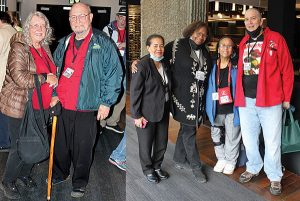
Chowdhury, Special Guest Owl Goingback (Left)
The WFC art show was extremely small, not a surprise considering both COVID and border implications. It featured art by GOH John Picacio, an in memoriam exhibition for late, great Stephen Hickman, and a few other exhibits including Bryan Jones’s chain mail and art by Margaret Organ-Kean. On Hickman, Picacio said, “He was really beloved in the art community by both pros and fans, and I thought it was a generous gesture by both WFC and his family to present that display.” A festive art reception was held on Saturday evening, in a bubble space between the dealers’ room and the art show.
The mass autograph session was Friday night. A large hall which could have hosted the hundreds of authors which usually show up instead hosted a handful of individuals, many without their books on hand to sign. Regardless, the atmosphere was friendly and authors were in high spirits. Signers included E.C. Ambrose, Ellen Datlow, Steven Jones, Joshua Palmatier, Delia Sherman, Susan Forest, and more.
AWARDS BANQUET
The World Fantasy Awards were held Sunday at 2:30 p.m. EST. 50 people attended, and the ceremony was livestreamed – with only minor sound glitches – to an unknown number of viewers. 2020’s virtual ceremony peaked at 169 concurrent viewers. Despite low attendance, the overall mood was jovial and, if anything, relaxed.
Toastmaster Christine Taylor-Butler opened by discussing Black History Month and a need to focus on joyful literature instead of solely on literatures of trauma. She exhorted listeners to read authors who are not on the New York Times bestseller list and to write one review a month, saying booksellers “pay attention to who’s paying attention.” Her overarching message was, “We are family.”
Gordon Van Gelder called for applause for everyone who put on the convention, saying, “I’m pretty sure this one took more work for anything to happen at all.” He and Ellen Datlow announced winners in each category. None of the awards winners were present, and several had not designated acceptors or sent in speeches. (Rumors that some nominees might not have been notified about their nominated status were later confirmed by an apology sent by the World Fantasy Board.)

Sean Dowie (Right)
Van Gelder talked about how Life Achievement Award recipient Megan Lindholm had started out writing for Humpty Dumpty and Jack and Jill as well as the SRA (Science Research Associates) testing modules for reading comprehension. Van Gelder lauded Lindholm’s dedication to craft: she’d told him that she can’t make the convention because she is working on books, and “she needs to make sure they are compelling, and that these are books that she would write if she hadn’t written all her previous books, as if this were her first book.” Convention chair Diane Lacey read Lindholm’s speech. Lindholm said she is “honored and humbled to be recognized this way…. Writing is a solitary profession. Me alone in a room with a keyboard. It’s a one-person effort. Until it isn’t.” She talked briefly about the many editors, translators, and more who have helped to produce her work, ultimately saying, “It is increasingly rare for a writer to have the privilege of working with the same editor for five or ten years. But Jane Johnson of Harper Collins in the UK has had her eyes watching and her blue pencil touching my work for close to 30 years. For that, we should all thank her.” Lastly, she thanked her readers.
Datlow gave a brief biography of Life Achievement Award recipient Howard Waldrop, and read from Bradley Denton’s appreciation in the program book. Eileen Gunn accepted for Waldrop, whose speech included echoes and other sound effects. “Today-day-ay I consider myself-self-elf the luckiest man-man-an on the face of the Earth-erth-rth.” His brief acceptance ended with, “A fair warning. I’ve been a nice guy up to the present. But now that I’ve won the World Fantasy Lifetime Achievement Award, I don’t care who I piss on, on the way down.”

The first World Fantasy Award of the evening, Special Award, Non-Professional went to Brian Attebery, for Journal of the Fantastic in the Arts. Van Gelder read Attebery’s speech, which said, “I’ve always thought that fans and academics are natural allies, but I never expected to have an academic journal considered for a World Fantasy Award. The nomination was in my name, but the Journal of the Fantastic in the Arts is a collected effort.” Attebery credited the IAFA, editorial predecessors, volunteers, contributors, and more.
The Special Award, Professional went to C.C. Finlay for F&SF editing. Charlotte Ashley accepted on Finlay’s behalf. “Back in 2014, when I began editing The Magazine of Fantasy & Science Fiction, I was intensely aware of the shoulders I stood on. The editors who preceded me on the masthead, every one of them, published classic stories, launched careers, and changed the genre for the better. So I am grateful that you feel my work has carried on the proud tradition of F&SF.” He likened the category to “comparing apples to oranges to monkey wrenches to lemurs. So when I consider the other nominees, and the amazing work they’ve done, I am even more humbled by this recognition.” Finlay thanked “the people behind the scenes,” in particular Stephen Mazur, Lisa Rogers, Nina Kirki Hoffman, and Jerry Oltion, including first readers, “especially Traci Castleberry, who was an absolute reading machine.” He finished by saying, “Any gleam on this trophy is a reflection of your brilliance. And thank you to Gordon Van Gelder, F&SF’s publisher, who emailed me back in 2013 and asked if I wanted to be an editor. I hope my answer of ‘Hell, yes’ turned out to be less hell and more yes.” He entreated listeners to continue reading the magazine, saying, “Sheree Renée Thomas is already a giant. The magazine is as fresh and sharp as it has ever been.”
Rovina Cai won the award for Best Artist. In the absence of an acceptor or speech, John Picacio took the podium, saying, “We’re often not seeing enough people from outside of the US win these awards, especially the art categories, and we certainly don’t see enough women, over the years, being winners, much less nominated sometimes.” He described Cai’s work as “powerful” and praised the jury for “getting it right.”
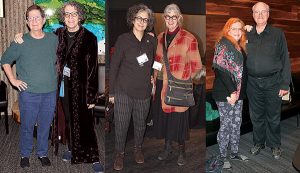
Best Collection went to Where the Wild Ladies Are by Aoko Matsuda, and The Big Book of Modern Fantasy edited by Ann & Jeff VanderMeer won the Best Anthology Award. No speeches were available for either of these category winners.
“Glass Bottle Dancer” by Celeste Rita Baker, published in the April 2020 issue of Lightspeed, won the Best Short Fiction award. Van Gelder read Baker’s speech, which said, “First of all, writing this doesn’t even make no damn sense! What the what now? Thank you. I’m glad so many people enjoyed my story. I’ll try to write a few more.”
The World Fantasy Award for Novella went to Riot Baby by Tochi Onyebuchi. Datlow read Onyebuchi’s speech, thanking judges, voters, and the other nominees. He thanked editor Ruoxi Chen, Caroline Perny, Irene Gallo, and others from Tordotcom publishing. “Riot Baby is… a story about liberation and oppression. And I owe so much about my understanding of these things, my vocabulary, to the Palestinians. It was learning about the history of Palestine in high school that opened my eyes to the world of post-colonial liberation movements. How they encompass both the grenade launcher and the no. 2 pencil. And it was a stay in Ramallah during my time in law school that taught me about what incarceration can do to a person, how it can represent an apocalypse, not just for the individual, but for an entire community. An entire peoples.” Onyebuchi thanked Palestinian writers Rashid Khalidi, Mahmoud Darwish, Ghassan Kanafani, Isabella Hammad, Edward Said, and Liyana Badr: “Riot Baby does not exist without you.”
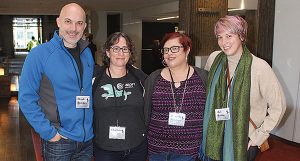
The Best Novel Award went to Trouble the Saints by Alaya Dawn Johnson. Van Gelder read Johnson’s speech, who said, “The World Fantasy Award has always been a dream of mine, and I was overjoyed to find myself nominated this year.” She thanked the people who helped make the book happen “over the seven years of writing and rewriting,” including agent Jill Grinberg and editor Miriam Weinberg. “Trouble the Saints is a book about memory, about struggle, about what we owe the past and the future. The year since it came out has been a hard one, to put it mildly. I dedicated this book to my grandmothers, and an awareness of my ancestors and their struggle is laced throughout the text. This is important to me as a Black woman, but it seems to me that an acknowledgement of our very brief place in history, of those who have gone before us and will go after us, is at its heart a consideration of justice, which everyone should care about. The continued exploitation of the people and the resources of our planet has never been more obviously unsustainable. Fantastic literature can be a powerful tool to reimagine the past. I hope that it, and our diverse community, can also be a vital part of what pushes us to remake our future.”
At the end of the awards, a trailer for short film Night of the Cooters was played, based on Howard Waldrop’s 1987 novel. Wrapping up the convention, awards judges Siobhan Carroll, Brian Evenson, and Patrick Swenson held a hybrid panel plus Q&A session discussing this year’s awards process. Judges Tobias Buckell and Cecilia Dart-Thornton were absent from the panel.
On November 11, the organizers sent out a notice of “a positive Covid result that was likely contracted during the convention.”
The next World Fantasy is scheduled to be held at the Hyatt Regency in New Orleans, November 3-6, 2021. For general World Fantasy information see their website.
–Arley Sorg
This report and more like it in the December 2021 issue of Locus.
 While you are here, please take a moment to support Locus with a one-time or recurring donation. We rely on reader donations to keep the magazine and site going, and would like to keep the site paywall free, but WE NEED YOUR FINANCIAL SUPPORT to continue quality coverage of the science fiction and fantasy field.
While you are here, please take a moment to support Locus with a one-time or recurring donation. We rely on reader donations to keep the magazine and site going, and would like to keep the site paywall free, but WE NEED YOUR FINANCIAL SUPPORT to continue quality coverage of the science fiction and fantasy field.
©Locus Magazine. Copyrighted material may not be republished without permission of LSFF.





